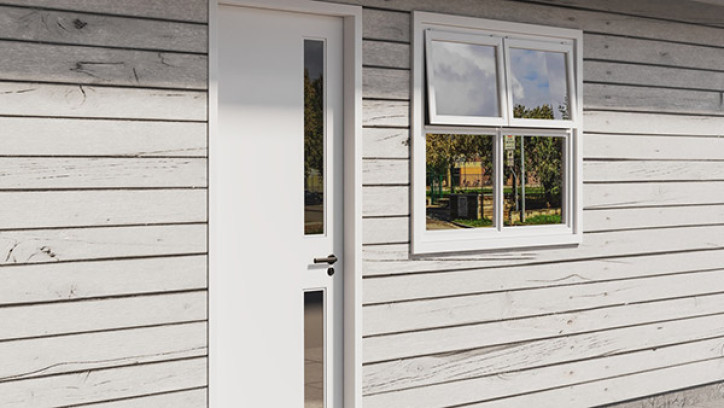3.1 Windows and exterior doorways in existing dwellings and outbuildings

A building consent is usually not required for building work related to a window or exterior doorway in an existing dwelling.
This exemption allows you to carry out any building work in connection with a window (including a roof window, whether it is fixed or opening) or an exterior doorway without needing a building consent where it is an existing dwelling or outbuilding. That is as long as the original doorway or window has not failed prematurely and replacing it will not modify or affect any specified system, such as sprinklers or fire alarms.
If you are replacing a window, roof window or door, it is important to consider whether it originally met the durability requirements of the Building Code. In most cases, doors and windows in an external wall are required to last at least 15 years. Most windows and doors should achieve this requirement with regular maintenance.
If the door or window is older than 15 years and you are replacing it because it has rotted out, then this work will not require a building consent.
However, if you are replacing a window, roof window or door that has been installed within the last 15 years and it has failed (eg it has rotted out), this work will require a building consent. This recognises that replacing a window or door that has failed its durability requirements with a similar window or door could result in the replacement also failing.
All new building work must comply with the Building Code, including the structural performance requirements. Also note that, on completion of the building work, the altered building must comply with the Building Code to at least the same extent as it did before the building work was undertaken, unless it already exceeded the code.
If you are considering building work that is close to or involves potentially load-bearing walls, it is important to get professional advice from a chartered professional engineer, registered architect, building consultant or registered building surveyor.
Any changes or additions to doors or windows where the building forms part of the compliant pool barrier, must comply with the Building Act 2004.
What is exempt
- A builder installs a roof window to an upper level apartment of a 2 storey multi-unit dwelling which will go between the existing roof trusses without altering any specified systems.
- Following earthquake damage, a builder decides to install a bi-fold door to replace a pair of French doors leading from the ground floor dining room of a 2 storey dwelling. As the wall opening for the new joinery is wider than the existing opening, they need to install a new lintel to span the opening.
- To gain more sunlight, a home owner decides to install a window in an external fire-rated bedroom wall which contains no other openings. As the window will be less than 1 metre from the boundary, the owner instructs the builder to install a fire-rated window to meet the Building Code requirements.
- Removing a dwelling’s lounge window and covering the opening with external cladding and internal linings to form a wall with no opening. Note that minimum Building Code requirements will still need to be met for ventilation, natural light and visual awareness of the outside environment.
What needs consent
- A window installed in an existing outbuilding six years ago needs to be replaced because of a rotten timber window frame. Replacing this window requires a building consent because it has failed its 15 year durability requirement.
- The owner of a commercial building wants to install a roof window into an existing roof and ceiling to a top floor office. As this building is not a dwelling or outbuilding, and as the roof window installation will affect the existing sprinkler system, a building consent is required.
What the law says
8. Windows and exterior doorways in existing dwellings and outbuildings
Building work in connection with a window (including a roof window) or an exterior doorway in an existing dwelling that is not more than 2 storeys or in an existing outbuilding that is not more than 2 storeys, except:
(a). in the case of replacement, if the window or doorway being replaced has failed to satisfy the provisions of the Building Code for durability, for example, through a failure to comply with the external moisture requirements of the Building Code; or
(b). if the building work modifies or affects any specified system.